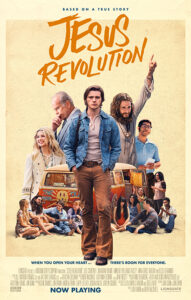When most moviegoers see the long list of credits start to roll at the end of a film, it may mean it’s time to gather up the empty popcorn boxes and beverage cups. But for those who poured their heart into a movie, that list of credits represents months or perhaps even years of hard work.

‘Jesus Revolution’ producer Daryl Lefever spoke to LBC Communication students about his work as a producer on major films over his 30-year career.
Producer Daryl Lefever is one of those film professionals who, over a 30-year career, has seen his name in the credits many times, with one of his most recent projects being the hit film “Jesus Revolution.” Lefever recently spoke to Lancaster Bible College students in the brand-new course, Media Production & Distribution, taught by Communication & Media Arts Department Chair Ryan Geesaman. After sharing with students about his career in film and answering questions, Lefever also helped critique students’ pitches that were part of their coursework.
Lefever’s relationship with LBC isn’t new, as his wife, Cindy (Gladfelter ’90) Lefever, graduated from the college with a counseling degree. In fact, the Lefevers dated while Cindy was a student at LBC and even got engaged while the 1989 championship women’s volleyball team was playing in the National Christian College Athletic Association Nationals at Pacific Christian in Fullerton, Calif.
“So our history with LBC goes a long way,” Daryl says.
Little did the Lefevers know they would return to the West Coast to live for many years as Daryl worked in the mecca of filmmaking—L.A. While he’s worked in the film industry for decades, he’s only recently focused on Christian filmmaking.
One of Lefever’s first full-time jobs was far from film, working in the trucking industry. He was unhappy with this stop along his career path when a friend asked him at the age of 26, “What would you do if you could do anything?”
“Growing up in Lancaster County,” Lefever says, “that wasn’t really a question you got asked a lot back then. You either went to college and became a teacher or engineer, or you didn’t go to college and you became an electrician or plumber. And those were the options in the early ‘90s—not a lot of people talking about (working) in the entertainment industry.”
Lefever answered his friend that he would make movies, to which his friend responded, “Why don’t you?”
 “So for the first time in my life, I actually had a dream and something I wanted to pursue,” Lefever remembers.
“So for the first time in my life, I actually had a dream and something I wanted to pursue,” Lefever remembers.
Daryl quit his job, and he and Cindy moved with their 4-week-old son to Virginia Beach to begin working for free with Regent University on three student films. He then got a position on a Universal miniseries that was shooting in the area. To be a part of it, he went into the film office and said, “I’ll do anything.”
It turned out that “anything” involved driving a minivan for six months, both transporting the cast and driving the actual film to the airport every day so it could be developed in Los Angeles.
Through that experience, Lefever made more friends in the film industry and moved to Los Angeles, which, he says, was necessary at the time because the film process was very centralized to L.A.
Fast-forward 30 years, and Lefever has worked on a number of mainstream films, many with Warner Bros., such as “The Polar Express,” the first movie in the “X-Men” series, “Mighty Joe Young,” “Wild Wild West” and many more in the late 90s and early 2000s.
Lefever started in L.A. working as a Production Assistant, sometimes getting coffee and running errands, until he mentioned that he had accounting experience after working in his father’s business in Intercourse, Pa. The very next week, Lefever was a member of the accounting team.
In 2008, Lefever made the transition to faith-based films. “I felt called by the Lord to do it,” he says, and while he felt very good about his decision at first, he then realized very few at the time were making faith-based film content.
Few, but not none.
At the suggestion of a pastor friend, Lefever contacted Kevin Downes, who was working on a movie adaptation of the book “The Shack” by William Paul Young. “So I reached out, and 15 years later, I’m still working with Kevin,” Lefever says.
Some of the films they’ve worked on together include “I Can Only Imagine,” a $7 million film that grossed more than $85 million, football film “Woodlawn,” and of course, “Jesus Revolution,” which at the time Daryl spoke in the LBC class, had been in theatres for seven weeks and had crossed the $50 million threshold. “Which,” Lefever says, “in a post-COVID world is pretty amazing.”
Geesaman shares that creating opportunities for LBC students to learn from Christian professionals who are working in secular industries is not only a testament to LBC’s commitment to biblical integration in every course, but it also allows students to get a glimpse into the occupations where they hope to make impact.
“As often and as much as possible, we try to bring in guests who are doing good work in their respective fields to talk to our students,” Geesaman says. “Daryl was a special treat as someone who grew up near LBC, worked in Hollywood and is now elevating the quality and reach of faith-based films. The students are able to see how the formational work they are doing now is preparing them for the careers of their futures.”

Kimberly Williams Paisley plays Charlene, a struggling mother to a young Greg Laurie in the 1970s in “Jesus Revolution.”
Released by Lions Gate Entertainment—incidentally, not a Christian film company—“Jesus Revolution” follows the true story of a young Greg Laurie (played by Joel Courtney), who in 1970 is searching for all the right things in all the wrong places. That’s until he meets Lonnie Frisbee (played by Jonathan Roumie, well known for his role as Jesus in “The Chosen”), a charismatic hippie street-preacher. Together with Pastor Chuck Smith (played by Kelsey Grammer, best known for his character, Frasier Crane), they open the doors of Smith’s languishing church to an unexpected revival of radical and newfound love, leading to what TIME magazine dubbed on its June 21, 1971 cover, a “Jesus Revolution.”
Lions Gate, Lefever says, is thrilled with the success of “Jesus Revolution” and wants to do more films with Downes and Lefever.
Throughout his career, Lefever has also worked with Fox and Disney and has stepped into many roles, but his main responsibilities now are on the producing side. One of the questions he’s asked most often is, “What exactly does a producer do?” Well, that depends.
Some movie producers simply own the rights to the story or the book and may have nothing to do with the filmmaking process. Other types of producers work only on the financial agreements with the studios or secure funding. Still others might serve as a pathway to a director or actor, sometimes never actually stepping onto the set. Producers like Lefever, however, are intimately involved in the film process, from call to wrap, are on set all day every day, and also work to keep the film on budget, secure equipment and manage the set and production.
No matter the type of film work, one thing is always central.
“I always wanted to produce content for the Lord,” Lefever says. “That was always the point.”
However, that commitment hasn’t guaranteed that Lefever’s work has always perfectly intersected with his faith. He remembers one opportunity to work as a production accountant on a film that would have been a significant promotion for him. Without knowing anything about the movie, he met with the producer and learned the story focused on the queen of hell who was looking for a mate so they could have a child who would become the prince of hell.
Lefever went home from the meeting with “a lot of emotion.” While the plotline certainly didn’t align with his beliefs, he asked himself if he could serve as a light in a dark situation if he worked on the film. Plus, he asked himself, what would the film company say if he turned it down? Would they want to work with him again?
Seeking advice, he again turned to a pastor friend, who truthfully told Lefever that if he worked on the movie, he would be putting himself under the authority of those who wanted to tell this story. And his name would be listed among the credits forever.
“That really struck me,” Lefever said. He knew what his decision had to be.
He approached his boss to discuss how he was uncomfortable working on the film that didn’t line up with his belief system. His supervisor said, “Oh, so you really care about the projects you work on! Let’s find you something that you’ll love.”
“I was completely blown away, and I just felt really protected by God in that moment,” Lefever says.
Rather than the film Lefever turned down, Warner Bros. instead assigned him to work on “Where the Wild Things Are,” an adaptation of the beloved 1963 children’s book by author and illustrator Maurice Sendak. Lefever and his family spent eight amazing months in Australia for the movie and became involved in a church that “brought us alive spiritually—it was so wonderful.”

“Jesus Revolution” stars Kelsey Grammer, left, as Pastor Chuck Smith and Jonathan Roumie, right, as hippie street-preacher Lonnie Frisbee.
Now that “Jesus Revolution” is heading to digital formats and DVD/Blu-ray in the spring of 2023, Lefever has many exciting projects on the horizon. A resident of Nashville since 2022, he recently finished shooting a film in Kentucky with Ethan Hawke and a host of other stars. Soon after the LBC Media Production & Distribution class, Lefever headed to Oklahoma to scout locations, start to make script cuts and prep for long shooting days for another upcoming project. Additionally, Lefever is reading scripts for several other films: a period piece, a war film, a missionary story and a Christmas film.
Even though the filmmaking process can be long and varied, Lefever says he enjoys the post-production process the most. Actually, he says, a movie’s story is told three times—once in the script, once while shooting and again in editing—and changes, sometimes significant, occur during the storytelling process. For example, in “Jesus Revolution,” Lefever shares, the personality of the Lonnie character, played by Roumie, changed drastically. In fact, about 20 minutes of the film was cut so viewers could focus on what God was doing through Lonnie rather than his somewhat abrasive personality.
These are iterations of films that are never seen by most moviegoers, although, Lefever shares, “Jesus Revolution” was screened about 500 times before its release in early February 2023. Large churches had the opportunity to screen it in front of 2,000 to 3,000 people, and the movie was also shown to the entire student body of Liberty University with the goal to create excitement through positive word of mouth.
Lefever is working in Christian film at a time when faith-based movies are gaining larger audiences and even cracking the top box office lists. The reason?
“People are willing to put more money into them to up the quality and up the acting; acting is a skill set that people deserve to be paid well to do,” Lefever says. “The other thing is that, in some ways, you can make a better quality product for less money now than you used to be able to because of the technology.
“I think the genre is opening up to all different kinds of stories,” he continues, “where before, people felt you had to put the sermon first, ahead of the story. … Now, people just want to see good stories, and it’s great if it draws people to the Lord or lifts His name up or shows that He’s on the throne or shows God is good. But at some level, it has to be entertaining.”
Moviegoers, after all, won’t spend $30 for an evening out if a film doesn’t center on a good story, feature good acting and look good. In fact, Lefever says, the better films become, the more critical audiences are—in a positive way. Therefore, there’s more drive to understand the entertainment side of Christian filmmaking. Audiences, he adds, are less likely to see a movie just because it’s a Christian film but because it looks like a good movie overall. Additionally, Lefever says, studios are becoming more willing to get behind faith-based films.
“The fact that Lions Gate, the same studio that just put out ‘John Wick’ and put out ‘The Hunger Games,’ was willing to fund and distribute a movie called ‘Jesus Revolution’ is pretty courageous, especially in today’s climate,” Lefever says. “So we’re certainly grateful they’re willing to do that—not every studio would.”
